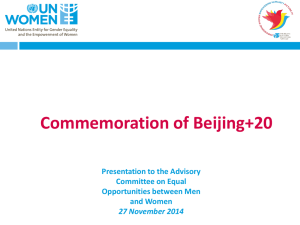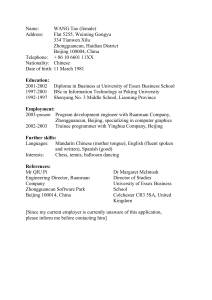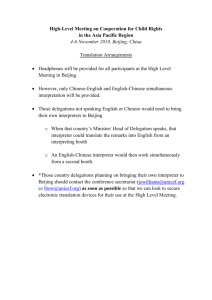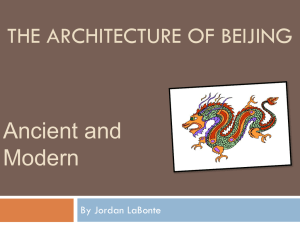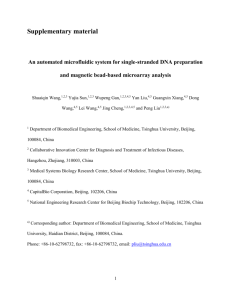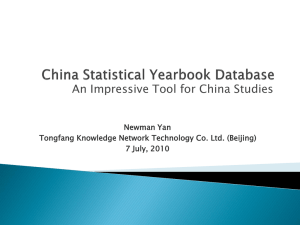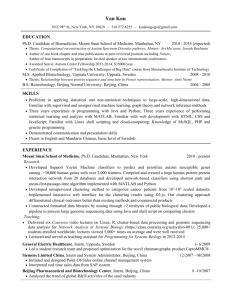China as a Global Power, Middle-Income Country, and Low
advertisement
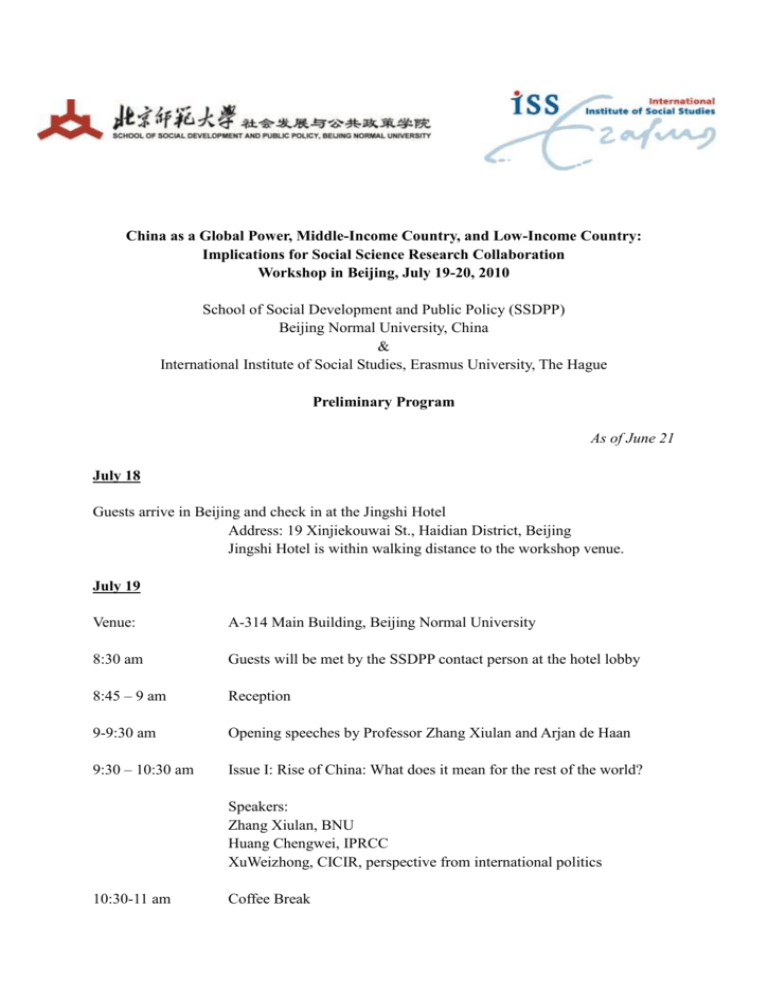
China as a Global Power, Middle-Income Country, and Low-Income Country: Implications for Social Science Research Collaboration Workshop in Beijing, July 19-20, 2010 School of Social Development and Public Policy (SSDPP) Beijing Normal University, China & International Institute of Social Studies, Erasmus University, The Hague Preliminary Program As of June 21 July 18 Guests arrive in Beijing and check in at the Jingshi Hotel Address: 19 Xinjiekouwai St., Haidian District, Beijing Jingshi Hotel is within walking distance to the workshop venue. July 19 Venue: A-314 Main Building, Beijing Normal University 8:30 am Guests will be met by the SSDPP contact person at the hotel lobby 8:45 – 9 am Reception 9-9:30 am Opening speeches by Professor Zhang Xiulan and Arjan de Haan 9:30 – 10:30 am Issue I: Rise of China: What does it mean for the rest of the world? Speakers: Zhang Xiulan, BNU Huang Chengwei, IPRCC XuWeizhong, CICIR, perspective from international politics 10:30-11 am Coffee Break 11 am – 12 pm Issue I continued Speakers: AshwaniSaith, ISS Alakh Sharma, IHD, perspective from another BRIC Jeffrey Henderson 12 – 1:30 pm Lunch (venue TBD) 1:30 – 2:30 pm Issue II: China’s New Global Role Speakers: Li Xiaoyun, CAU May Tan-Mullins and Marcus Power, Miguel Salazar 2:30 – 3:30 pm Issue II continued Speakers: Bram Buscher Murat Arsel Frauke Urban 3:30 – 4 pm Coffee Break 4 – 5 pm Issue III: Development Models and Transition: The Role of Agriculture Speakers: Li Xiaoyun, CAU Jiang Pingan, XAU Nico Heerink, Agricultural University of Wageningen 5 – 6 pm Issue III continued Speakers: Murat Arsel and Anirban Dasgupta, ISS Zhao Yongjun, University of Groningen 6:30 pm Dinner (venue TBD) July 20 Venue: A-314 Main Building, Beijing Normal University 9 – 10 am Issue IV: Old and New Poverties and Vulnerabilities Speakers: Wang Xiaoyi, CASS Zhang Xiaoshan, CASS Lu Caizhen, Kunming 10 – 11 am Issue IV continued Speakers: Peng Xizhe, Fudan Sarah Cook Mahmood Messkoub Xiao Suowei, BNU 11 – 11:30 am Coffee Break 11:30 am – 12:30 pm Issue V: Management as Development Approach and the Beijing Consensus Speakers: XueLan, Tsinghua Qiao Jianrong, DFID Beijing, experiences from health sector reform Yu Xiaomin, BNU 12:30 – 2 pm Lunch (venue TBD) 2 – 3 pm Issue V continued Speakers: Nyiri Pal, Free University Amsterdam Arjan de Haan, ISS Andrew Fischer 3 – 3:30 pm Coffee Break 3:30 – 4:30 pm Issue VI: Research Collaboration 4:30 – 5 pm Concluding Remarks 6 pm Dinner (venue TBD) List of Participants Arjan de Haan, Institute of Social Studies, The Hague Andrew Fischer, Institute of Social Studies, The Hague Ashwani Saith, Institute of Social Studies, The Hague Murat Arsel, Institute of Social Studies, The Hague Anirban Dasgupta, Institute of Social Studies, The Hague Bram Buscher, Institute of Social Studies, The Hague Mahmood Messkoub, , Institute of Social Studies, The Hague Zhang Xiulan, School of Social Development and Public Policy, Beijing Normal University Miguel Salazar, School of Social Development and Public Policy, Beijing Normal University Hu Xiaojiang, School of Social Development and Public Policy, Beijing Normal University Yu Xiaomin, School of Social Development and Public Policy, Beijing Normal University Xiao Suowei, School of Social Development and Public Policy, Beijing Normal University Zhao Yongjun, University of Groningen Nico Heerink, Agricultural University Wageningen Pal Nyiri ,Free University Amsterdam Sarah Cook, United Nations Research Institute for Social Development Alakh Sharma, Institute for Human Development Jeff Henderson, Centre of East Asian Studies, University of Bristol May Tan-Mullins, International Studies Program, University of Nottingham Ningbo, China Marcus Power, Department of Geography, Durham University Frauke Urban, Institute of Development Studies, UK Qiao Jianrong, UK Department for International Development Halima Begum, UK Department for International Development Huang Chengwei, International Poverty Reduction Centre Centre, China Jiang Pingan, Xinjiang Agricultural University Li Xiaoyun, College of Humanities and Development Studies, China Agricultural University Tang Lixia, College of Humanities and Development Studies, China Agricultural University ZhaoLixia, College of Humanities and Development Studies, China Agricultural University Wang Xiaoyi, Institute of Sociology, Chines Academy of Social Sciences Wang Lei, Bureau of International Cooperation, Chinese Academy of Social Sciences Zhu Ling, Institute of Economy, Chinese Academy of Social Sciences Zhang Xiaoshan, Institute of Rural Development, Chinese Academy of Social Sciences Cui Hongzhi, Institute of Rural Development, Chinese Academy of Social Sciences Xue Lan, School of Public Policy and Management, Tsinghua University Lu Caizhen, Kunming Institute of Botany, Chinese Academy of Sciences Peng Xizhe, School of Social Development and Public Policy, FudanUniversity Xu Weizhong, China Institute of Contemporary International Relations Contact Persons for Logistic Arrangement Ms. Han Ruilian Email: hanruilian@bnu.edu.cn Tel: +86 (10) 58802804 ext. 806 Cell: +86 15210174632 Mr. Wang Xinsong Email: xinsong@bnu.edu.cn Cell: +86 13910037605 Workshop aims and objectives China is rapidly (re-)emerging as a global economic and political actor, which we believe had direct implications for research collaboration. Under the Joint-Scientific Thematic Research Programme, ISS the Hague and Beijing Normal University is hosting an international workshop on the implications of China being simultaneously a developing country, a middle-income country, and an international donor and increasingly important actor in international organisations. The aim of this dialogue is to articulate priorities for future Chinese-Dutch research collaboration, within the field of international development studies. This focuses on the role of inter-disciplinary social science research, which historically has focused on developing countries and funded as ‘aid’ activity, and is now presented with the challenge and opportunity to re-define its role in and modes of cooperation with China and other emerging economies. This will be achieved through a series of thematic discussions, in the form of a workshop over two days. Specific objectives of the workshop are: 1. To discuss the theoretical implications of the ‘rise of China’. What does its development path imply for mainstream development theories, such as modernisation, political-economy and dependency approaches? What are implications of knowledge on China for international debates on, for example, development transitions, patterns of reform, the role of research and innovation in policy making. Is the development of China historically unique, and what are parallels with the rise of South Korea, India, and Brazil? What are new patterns of South-South collaboration, the role of China in this, and new ways of engagement of Northern research institutions? 2. To formulate ideas for future research collaboration in key areas of development, and to identify comparative advantage. A list of possible themes includes: a) Is there a Beijing Consensus? China’s reforms since 1978 and lessons for development theories, for the Washington and Post-Washington consensus, and for political economy and neo-classical approaches. Can China’s experience of reform unlock some of the impasses in current international debates, such as on globalisation, and state versus markets? b) Inclusive growth: The rapid reduction of poverty, transition to new forms of poverty and social exclusion, challenges posed by uniquely rapid ageing, and approaches to poverty and local development in remote areas. Are there lessons from the Chinese experience, for other developing countries, and for China’s new aid programme, in Africa and elsewhere? c) Sustainable earth, domestically and internationally: climate change, possibilities to move to a low-carbon and sustainability of current growth path, management of and governance reform of natural resources, land and water. China and the OECD post 2008: the economic crisis, social security and stimulus of the domestic economy, and new forms of integration into and de-coupling from the world economy. This global transformation is arguably the most important change in international development in the first part of the 21st century. What are the implications for research collaboration, and for modes of research funding?
